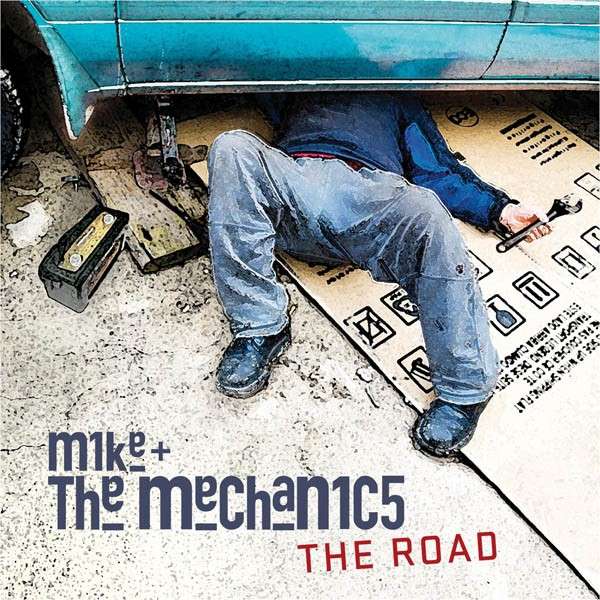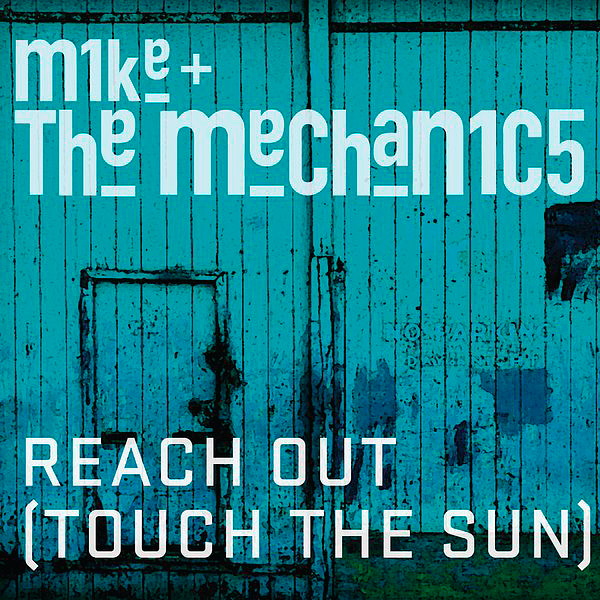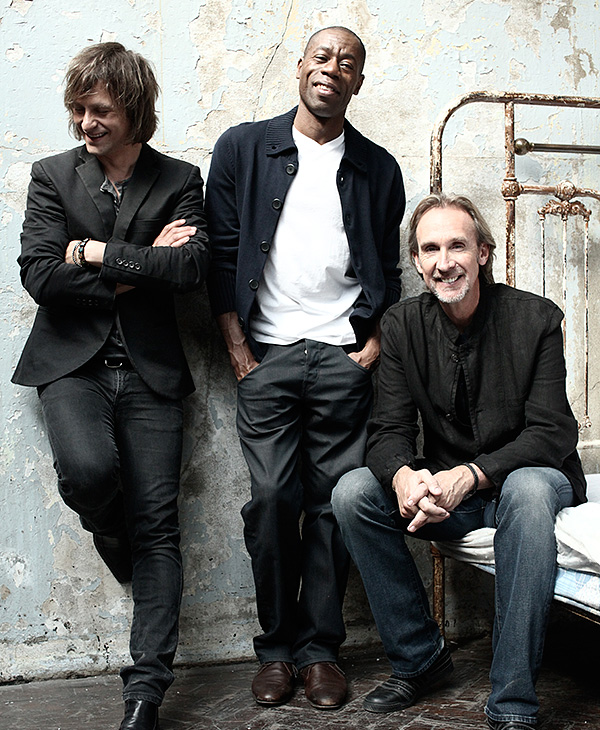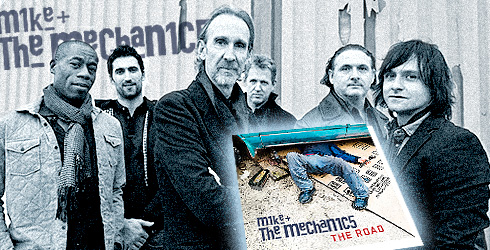- Article
- Read in 11 minutes
Mike + The Mechanics – The Road – review
Mike Rutherford starts over and relaunches his highly successful solo project with a new line up that consists of familiar names and new faces. Christian Gerhardts about his impressions of the album.
A new departure for Rutherford: The Road is Mike + The Mechanics’ seventh studio album. Much has changed and yet not everything is new. It is not just the line-up of The Road that reminds one of the more successful years of the Mechanics..
1999:
Mike Rutherford tours with Paul Carrack and Paul Young and their tour musicians Gary Wallis (drums) and Jamie Moses (guitars). It is the last tour of the classic line-up. Paul Young passes away a year after, and the Mechanics are on hold.
2003:
Rutherford announces the surprising comeback. In 2004, Rutherford and Carrack release Rewired. It is an unusual Mechanics album in many ways. The live shows continue hardly any material which Paul Young used to sing. A courageous decision. The album is less successful than previous records, but it spawns the band’s first live DVD, Live At Shepherds Bush. In the end, Carrack decides to end his involvement with Mike + The Mechanics (see the interview).
2009
… hears rumours that Rutherford is working on a new album. Names like Chris Neil are passed around, but the most important news is that Andrew Roachford will become the new singer of the Mechanics. Soon after that two other names are mentioned: Arno Carstens and Tim Howar. The latter is a Canadian musical actor with his own indie band, van Tramp. The job distribution is clear: Roachford is sort of the successor to Paul Carrack while Howar will sing the Paul Young songs.

Towards the end of 2010 everything became clear: The trio of Rutherford, Roachford and Howar recorded a new Mechanics album called The Road. On stage they are supported by Gary Wallis and Anthony Drennan, both of who also play on the album. Anthony Drennan is certainly one of the bigger surprises of the line-up. Rutherford and he know each other from the post-Collins Genesis period.
A new album
The Road comes out on April 08, 2011 in Germany and a couple of days later world-wide. A digital single called Reach Out (Touch The Sun) has appeared at major retailers of digital music (iTunes, amazonMP3 and so on) in late February. Reach out is sung by Andrew Roachford. The new Mechanics website went online just in time for the single release. The Road contains eleven songs (see below for a full list). The song titles vary a bit, though. Try To Save is called Try To Save Me at times, for example, and You Can Be The Rock is sometimes listed as You Can Be.
Another important change: Mike + The Mechanics are now signed to Sony Music. The album was produced by Mike Rutherford and Christopher Neil. It was mixed by Mike’s son Harry Rutherford.
The cover design follows the Mechanics tradition. The original font was used again after other fonts had been tried out for their albums Beggar On A Beach Of Gold, M6 and Hits. What is interesting is the colour of the car on the cover – it closely resembles the car on Peter Gabriel’s solo debut album Car.
The Songs
01 The Road (4:20)
Rutherford / Neil / Sutton
Vocals: Andrew Roachford (lead), Tim Howar
Background Vocals: Christopher Neil, Hazel Fernandez, Beverly Brown Mary Pearce
Guitars: Mike Rutherford, Anthony Drennan, Martin Sutton
Bass: Mike Rutherford
Keyboards: Andrew Roachford, Luke Juby, Toby Chapman
Drums: Gary Wallis
Organ: Peter Adams
Programming: Mike Rutherford, Martin Sutton, Harry Rutherford
Opening songs are usually considered the figurehead of an album. The title song is up-beat with rather cold, but acoustic sounds. It lacks some pep and drive to be really convincing. The Road introduces Andrew Roachford as a singer, the tune is catchy, but the song does not really get off the earth. It sounds a bit like a leftover song from the Beggar sessions. Still, it makes the listener curious about the album.
02 Reach Out (Touch The Sun) (4:03)

Rutherford / Roachford / Norton / Weaver
Vocals: Andrew Roachford (lead), Tim Howar
Guitars: Mike Rutherford, Anthony Drennan, Martin Sutton, Benjamin Weaver
Bass: Mike Rutherford
Keyboards: Luke Juby, Toby Chapman, Jamie Norton
Wurlitzer: Andrew Roachford
Hammond Organ: Peter Adams
Drums: Gary Wallis
Programming: Mike Rutherford, Martin Sutton
Additional Production: Graham Stack
Reach Out (Touch The Sun) is already known from the slightly tweaked single version. The measured verse trudge through a song that explodes in the chorus. It seems a bit artificial, and this approach gives the song a flair that is new to Mechanics material. The song has hit potential – and you realize with a start that you didn’t really realize that the Mechanics have new singers. Andrew Roachford does a stellar job with the song, and he occasionally sounds more like Paul Young than Paul Carrack.
03 Try To Save Me (3:47)
Rutherford / Roachford / Neil
Vocals: Andrew Roachford (lead), Tim Howar
Background Vocals: Christopher Neil, Hazel Fernandez, Beverly Brown, Mary Pearce
Guitars: Mike Rutherford, Anthony Drennan, Martin Sutton, Jamie Moses, Benjamin Weaver
Bass: Mike Rutherford
Keyboards: Luke Juby, Toby Chapman, Jamie Norton
Wurlitzer: Andrew Roachford
Hammond Organ: Peter Adams
Drums: Gary Wallis
Programming: Mike Rutherford, Martin Sutton, Harry Rutherford, Ben Robins
The up-tempo song Try To Save Me is a bit of easy listening. It resembles some song from the Beggar era. There does not really happen very much in the song, but it is arranged well and will put you in a good mood. And the fact that there is a new singer does not matter. Try To Save Me is a fine song all around. It follows the style of many a Mechanics song – in fact, it could be the second single because it is perfectly suited to the radio (and it has passed the motorway test). Jamie Moses, who used to tour with the Mechanics, plays on this song. – Remarkable: The first three songs on the album are sung by Andrew Roachford.
04 Background Noise (4:15)
Rutherford / Carstens / Neil
Vocals: Arno Carstens (lead)
Background Vocals: Tim Howar, Christopher Neil, Hazel Fernandez, Beverly Brown, Mary Pearce
Guitars: Mike Rutherford, Anthony Drennan, Martin Sutton
Bass: Mike Rutherford
Keyboards: Andrew Roachford, Luke Juby, Toby Chapman
Drums: Gary Wallis, Harry Rutherford
Organ: Peter Adams
Programming: Mike Rutherford, Martin Sutton, Harry Rutherford
The first eye-opener (as far as the line-up is concerned) is the balladesque Background Noise. You may think at first that it is Tim Howar at the microphone – and you would be wrong. The singer on this number is Arno Carstens, a South African who has established a solo career since the recording of the album. The promo texts and press photos indicate that he is not part of the current Mechanics line-up. Carstens’ voice is quite different from Andrew Roachford’s. Carstens lacks the insistent, loud element, but his singing is in quite a different league. He sounds more relaxed, almost sloppy – a bit like Mark Knopfler. The song itself is based on acoustic guitar and lives off the catchy chorus. Background Noise works very well. It is definitely an asset for the album.
05 I Don’t Do Love (4:34)
Rutherford / Neil / Howar / Roachford
Vocals: Andrew Roachford (lead)
Background Vocals: Tim Howar, Christopher Neil, Hazel Fernandez, Mary Pearce
Guitars: Mike Rutherford, Anthony Drennan, Martin Sutton
Bass: Mike Rutherford
Keyboards: Andrew Roachford, Luke Juby, Toby Chapman
Drums: Gary Wallis
Organ: Peter Adams
Programming: Mike Rutherford, Martin Sutton, Harry Rutherford
Do you really want to dance? Everyone of us remembers situations like this when the separation has just taken place and there are already new attractions. But do you want that? Are you going to risk being disappointed again? Are you going to fall for them? I Don’t Do Love is a typical Mechanics ballad with the potential to become a classic. Your mileage may vary, but this song will resonate with you if you happen to be at that point in your life.
This is, interestingly, the only song on the album that is a co-production of Mike Rutherford, Christopher Neil, Tim Howar and Andrew Roachford – these four are the core Mechanics. It is a song that had to be sung by Roachford. His voice fits the emotional dilemma that is described in the song. I Don’t Do Love is one of the few songs where the verses are more memorable than the chorus sung by Tim Howar. Do you really wanna dance?
06 Heaven Doesn’t Care (3:37)
Rutherford / Neil / Sutton
Vocals: Tim Howar (lead), Barry Hills School Choir
Background Vocals: Christopher Neil, Hazel Fernandez, Beverly Brown, Mary Pearce
Guitars: Mike Rutherford, Anthony Drennan, Martin Sutton
Bass: Mike Rutherford
Keyboards: Andrew Roachford, Luke Juby, Toby Chapman
Drums: Gary Wallis
Organ: Peter Adams
When there is a choir on a Mechanics song you automatically think of The Living Years. Heaven Doesn’t Care certainly is no match for that classic but it is one of the showpieces for the album. For the first time (and only on the sixth song!) we hear the second singer Tim Howar on lead vocals. The smoky element makes his song distinctive – his voice fits perfectly to the drama of a song that starts out as a ballad and grows ever bigger. Howar almost outdoes himself and roars out the song. Lots of depth, a great melody – a great song.
07 It Only Hurts For A While (4:09)
Rutherford / Carstens / Neil
Vocals: Arno Carstens (lead)
Background Vocals: Tim Howar, Christopher Neil, Hazel Fernandez, Beverly Brown, Mary Pearce
Guitars: Mike Rutherford, Anthony Drennan, Martin Sutton
Bass: Mike Rutherford
Keyboards: Andrew Roachford, Luke Juby, Toby Chapman
Drums: Gary Wallis
Organ: Peter Adams
Programming: Mike Rutherford, Martin Sutton, Harry Rutherford
After a string of excellent, classy songs It Only Hurts For A While is the quintessential interval piece. The song runs its course without anything special. It is not bad either, it is simply very middle-of-the-road. And it is sung by Arno Carstens.
08 Walking On Water (3:41)
Rutherford / Roachford / Norton / Weaver
Vocals: Andrew Roachford (lead)
Background vocals: Tim Howar, Christopher Neil, Hazel Fernandez, Beverly Brown, Mary Pearce
Guitars: Mike Rutherford, Anthony Drennan, Martin Sutton
Bass: Mike Rutherford, Ben Weaver
Keyboards: Andrew Roachford, Luke Juby, Toby Chapman, Jamie Norton
Drums: Gary Wallis
Organ: Peter Adams
Programming: Mike Rutherford, Martin Sutton, Harry Rutherford
Additional Production: Graham Stack
What we have said about It Only Hurts For A While also applies to Walking On Water. It is catchy song although it does not really take off. It is a bit more complex and stands out for this reason – perhaps it is because of the underlying restlessness from a rhythm that sounds rather technical. Andrew Roachford sings on this and it would be interesting to see how the song would have sounded with Tim Howar’s voice. The programmed rhythm part would not have been out of place on a Beggar B-side; the guitars, however, sound more like M6. An unremarkable song.
09 Hunt You Down (3:44)
Rutherford / Carstens / Neil
Vocals: Arno Carstens (lead)
Background vocals: Tim Howar, Christopher Neil, Hazel Fernandez, Beverly Brown, Mary Pearce
Guitars: Mike Rutherford, Anthony Drennan, Martin Sutton, Hugo Flower
Bass: Mike Rutherford, Ben Weaver
Keyboards: Andrew Roachford, Luke Juby, Toby Chapman
Drums: Gary Wallis, Harry Rutherford
Organ: Peter Adams, George Hewlett
Programming: Mike Rutherford, Martin Sutton, Harry Rutherford
Hunt You Down is definitely the good cheer corner of the album. Carstens’ voice fits this easy up-tempo song very well. The incredible keyboard/organ sound is almost cheeky. It sounds like the sound of one of those keyboards you would have had as a child or a teen. The song sounds terribly banal and the lyrics are not any better (“love is gonna hunt you down, now the chase is on, around and around”), but it sticks in one’s ears and proves just how strong a songwriter Mike Rutherford is. As Chester Thompson told Fachblatt (a music magazine) back in the 1990s: “Mike Rutherford has developed the most. He has an almost ideal way of arranging his songs.” Hunt You Down proves Thompson right. Mike’s son Harry Rutherford, incidentally, is listed as the drummer alongside Gary Wallis.
10 Oh No (4:17)
Rutherford / Neil / Howar
Vocals: Tim Howar (lead), Andrew Roachford
Background vocals: Christopher Neil, Hazel Fernandez, Beverly Brown, Mary Pearce
Guitars: Mike Rutherford, Anthony Drennan, Martin Sutton
Bass: Mike Rutherford, Ben Weaver
Keyboards: Andrew Roachford, Luke Juby, Toby Chapman
Drums: Gary Wallis
Organ: Peter Adams
Programming: Mike Rutherford, Martin Sutton, Harry Rutherford, Ben Robins
Though Oh No is not a musical fireworks the song nevertheless looks towards modern sounds and contemporary production more than the other songs. At times you can spot similarities to Now That You’ve Gone with which Rutherford & Co. surprised everybody in 1999. Tim Howar does not use the full potential of his voice on this song (as opposed to on Heaven Doesn’t Care), but that is perhaps all the better because the song would not really work otherwise. A single edit of Oh No may be a good choice for a radio single.
11 You Can Be The Rock (5:17)
Rutherford / Neil / Roachford
Vocals: Andrew Roachford (lead)
Background vocals: Tim Howar, Christopher Neil, Hazel Fernandez, Beverly Brown, Mary Pearce
Guitars: Mike Rutherford, Anthony Drennan, Martin Sutton
Bass: Mike Rutherford, Ben Weaver
Keyboards: Andrew Roachford, Luke Juby, Toby Chapman
Drums: Gary Wallis
Organ: Peter Adams
Programming: Mike Rutherford, Martin Sutton, Harry Rutherford, Ben Robins
The album finale is a typical Mechanics song. It seems Mike has a special talent for “final songs”. Just listen to Look Across At Dreamland, Going, Going…Home, Why Me or Taken In. You Can Be The Rock is closest to Taken In from that list as far as speed and rhythm are concerned. It is also the only song on the album that is longer than five minutes – and one of the few pieces with a real guitar solo.
All in all

Eleven songs, three singers and a motley line-up – The Road is a kind of family album. Mike Rutherford called in Anthony Drennan, an old acquaintance who used to be the live guitarist on the ’98 Calling All Stations tour. Then there is Harry Rutherford who was mainly involved with the production. The Road is definitely a Mike Rutherford project, even more so than previous Mechanics albums.
The new voices and the time between this and the previous record have been good for the album. The Road is not a killer album, but an entertaining record with typical Mechanics music. There are two or three spots of brilliant songs, and the mixture of ballads and faster songs is just right. The album could have done with a little more edge here and there. Many songs give the impression that, consciously or subconsciously, the producers wished to stay on the safe side. The overall sound of the album is rather cold, and it is the great vocal performances, e.g. on Heaven Doesn’t Care and I Don’t Do Love, that lend some warmth to the album.
A completely new band
It is curious that Roachford sings six songs and Tim Howar only two. Arno Carstens was apparently only involved in the early stages of the album development. The three songs he sings are probably left-overs from that phase.
Now for the central question: Would we buy this album if it did not say “Mike + The Mechanics” on the cover? It is very difficult to say. Fans of early Genesis will not enjoy The Road very much; those who like the later era and the numerous solo projects may enjoy it a lot. If you compare it with previous Mechanics offerings the album has touches of Beggar, the debut album and (less so) of M6. It certainly pulls away from Rewired towards authentic music. It is therefore even less fortunate that the album has such a cold sound.
Songs we would recommend listening to apart from the single release Reach Out (Touch The Sun) are Try To Save Me, Background Noise, I Don’t Do Love, Heaven Doesn’t Care and Hunt You Down. There is no total failure on the album.
We are looking forward to the live comeback with old friends and new voices – and of course we are interested in finding out how the Mechanics story continues. In the meantime The Road is much more than just some Background Noise.
by Christian Gerhardts

